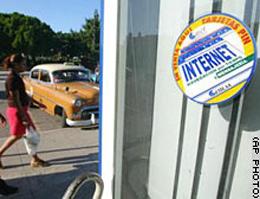 |
 |
 |
 Technology News | June 2006 Technology News | June 2006  
Facts About Cuba´s Access to Internet
 Prensa Latina Prensa Latina


| | Cubans walk by an Internet access cabin reserved for tourists in Havana. |
Havana - Digital disparity between First and Third Worlds is made worse by the US economic blockade on Cuba to prevent the island from having free access to the Internet.

A commentary posted today by the Cuban News Agency (AIN) says that in addition to financial restraints increasingly being placed on Cuba by Washington, the island is not allowed to connect to underwater optic fibre cables through which the overwhelming bulk of worldwide information flows.

Internet reception and transmission on the island is therefore reduced to satellite communication. This substantially limits the country’s connectivity capacity, causes the transmission of information to slow down and makes the process much more expensive.

For these reasons, the country set out to a development strategy to forge ahead in the ‘informatization’ of society. This is seen as the only way to have technology reach the broadest sectors of the nation and a larger number of people worldwide.

The informatization of society is defined in Havana as “the process of orderly and massive use of information and communication technology to satisfy the information and knowledge needs of all people and spheres of society.”

The issue has been touched upon on various occasions in speeches by Cuban President Fidel Castro, who recently expressed the official objective: “Millions of Cubans could communicate with millions of people in the world through the Internet”.

The first step in that direction took place in 1996 when the Ministry of Communications—which until then had been devoted to traditional postal work, telephone links and radio and television transmissions— was transformed into the Informatics and Communications Ministry.

A decade later, the island is showing notable advances in this important sector, as demonstrated by the growing number of citizens and institutions with Internet access and by in massive training of highly specialized engineers and technicians.

The scope of this effort would seem inconceivable in not only Third World nations, but in many First World countries.

So as not to offer an image that might seem overly optimistic, AIN refers to concrete aspects which are easily verifiable by any interested visitor to the country.

In Cuba, computer courses are included in the national education programs starting at the first grade level.

There are 26 Informatics Polytechnic Institutions in the provinces; these are equipped with modern digital technology and have an enrollment of 40,000 students of whom the first class will graduate in 2008.

In addition to the existing programs in the universities, in mid-2002 the Computer Sciences University (UCI) was created. It has 8,000 students selected from among the most talented and hard working in this specialty.

Complementing this effort there are over 600 Computer Clubs established and operating throughout the country’s 169 municipalities.

This project is important due to its egalitarian character: everyone can have access regardless of their age or occupation.

Some 800,000 people have graduated from universities, mainly young people. Up until today, over 200 of these facilities have Internet access and there are plans of extending this service to all of them.

There is also the INFOMED network, which belongs to the Health Ministry. Academics and professionals can also navigate with a personalized Internet access through special connections. This also includes doctors, journalists, artists and scientists.

Interviewed by the Cuban press, Engineer Roberto Santiesteban, director of the Data Business Unit which belongs to the island’s telecommunication company, offered a panorama of the future.

“The more we develop our Internet and more possibilities for connections, the service will spread nationally. This is conditioned by the cost and technological availability to Cuba, which is advancing on a yearly basis through the import of computers and making agreements with other nations,” said Santiesteban.

“Without a doubt these are the guidelines that will make it possible for any Cuban to have Internet access,” he concluded.

These are the facts on what is happening in Cuba´s present and future on Internet access. | 
 | |
 |



